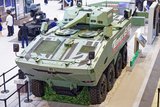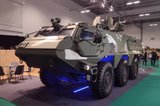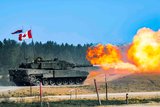Latvia orders Carl-Gustaf ammunition
The Latvian Ministry of Defence (MoD) has ordered $18.8 million worth of 84mm calibre ammunition for its Carl-Gustaf rocket launchers.
The order will ensure sufficient ammunition stock for Latvia's National Armed Forces and the National Guard.
Carl-Gustav anti-tank recoilless rifle is a shoulder-launched, multi-role weapon system with improved ergonomics and lightweight design that offers better mobility to the soldier.
According to an agreement signed by the MoD and the Swedish Defence Procurement Agency earlier this year, Latvia can purchase its Carl-Gustaf ammunition from Saab Dynamics jointly with Sweden and Estonia. This agreement replaced the previous arrangement, under which Latvia procured necessary articles under a five-year agreement, with optional two-year extension, concluded between Saab Dynamics, the European Defence Agency, Estonia, Lithuania, Czech Republic and Poland.
The first batches of ammunition will arrive in 2019.
Related Equipment in Defence Insight
More from Land Warfare
-
![Singapore Airshow 2026: ST Engineering’s Terrex s5 highlights hybrid power’s role in future warfare]()
Singapore Airshow 2026: ST Engineering’s Terrex s5 highlights hybrid power’s role in future warfare
Hybrid-electric drive technology may address the growing energy demands of land warfare in future.
-
![CAVS rides a wave and prepares for surge requirements as orders roll in]()
CAVS rides a wave and prepares for surge requirements as orders roll in
The Common Armoured Vehicle System is continuing to rack up orders as the British Army looks likely to become an operator of the vehicle, while Italy and Ireland are also contenders.
-
![US DoD task force’s DroneHunter acquisition lays groundwork for Replicator 2 CUAS strategy]()
US DoD task force’s DroneHunter acquisition lays groundwork for Replicator 2 CUAS strategy
As the US Department of Defense looks to counter the growing threat of uncrewed aerial systems to improve homeland security, the DroneHunter acquisition could point to future commercial innovation.
-
![Land forces review: Tanks, trucks and IFVs dominate but woes remain for Ajax]()
Land forces review: Tanks, trucks and IFVs dominate but woes remain for Ajax
This year has begun with main battle tanks taking the lead while orders for large logistics and support vehicles continued from last year. Additionally, two of the British Army’s most significant contracted vehicle programmes, Ajax reconnaissance vehicle and Challenger 3 tank, continued to make news in January.
-
![Canada looking to expedite purchase of armoured fighting vehicle and a new tank]()
Canada looking to expedite purchase of armoured fighting vehicle and a new tank
Canada is improving its Leopard main battle tank fleet but before this is fully completed, it is expected to begin looking for new vehicles.























